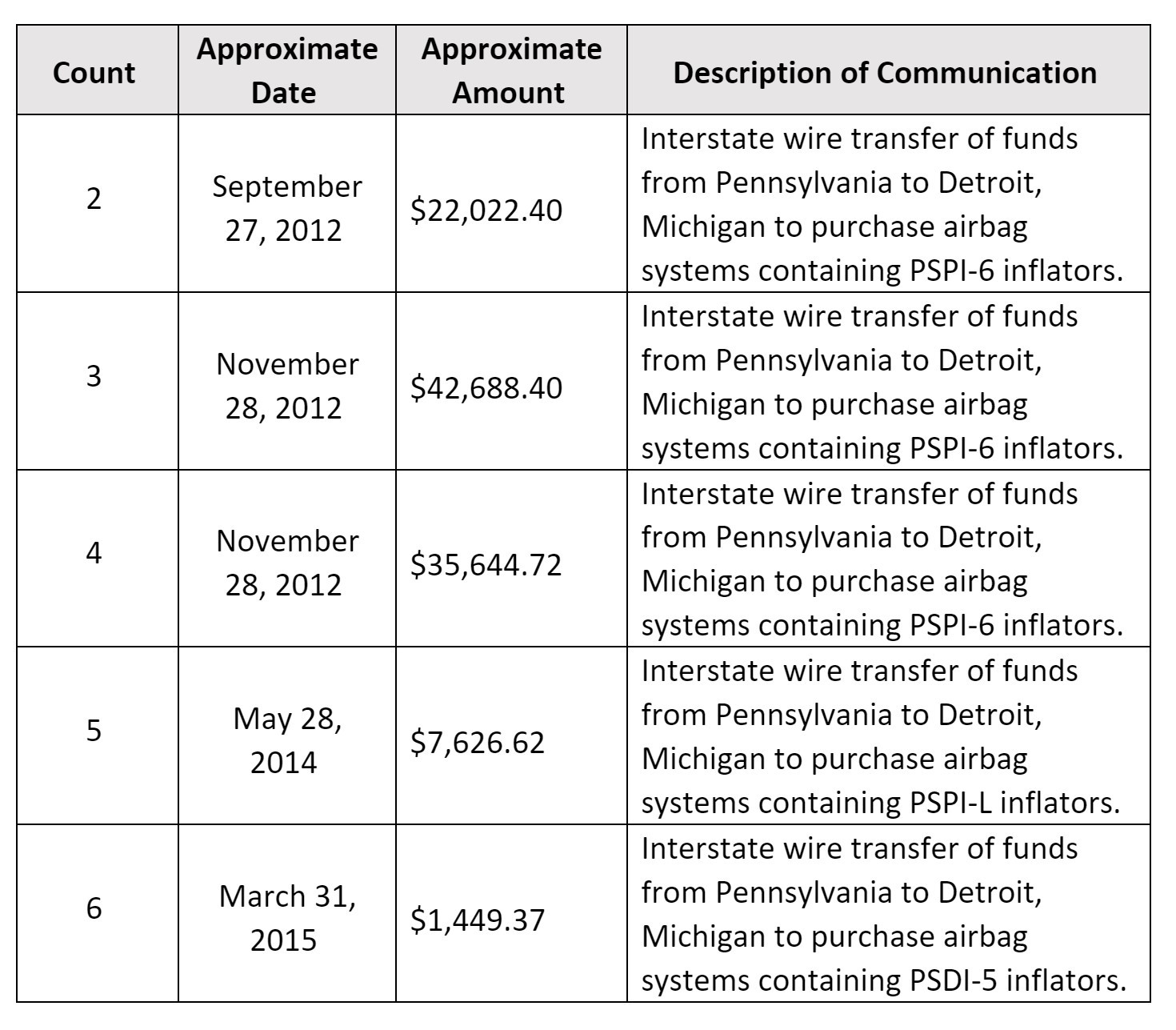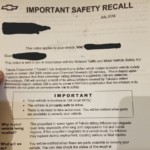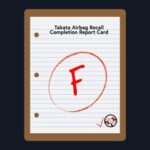The Takata Bounty Hunters
by Kevin Fitzgerald on September 11, 2018
On March 22, 2018, the Wall Street Journal reported three former Takata employees calling themselves whistleblowers reached a settlement with the company that ended their attempt to freeze $225 million of an $850 million legally mandated restitution fund for automakers. The fund was established from the $1 billion fine Takata received for pleading guilty to concealing a deadly defect in their airbags and was intended to repay car makers shouldering billions of dollars in costs to replace the faulty equipment. In exchange for $1.7 million, the three agreed to drop their case, allowing Takata’s bankruptcy to be finalized and the monies to be released.
The self-proclaimed whistleblowers sought their award under a nascent federal law called the Motor Vehicle Safety Whistleblowers Act passed by Congress in December of 2015. The program allows industry insiders to report on violations of federal vehicle-safety laws and receive 10% to 30% of monetary sanctions over $1 million that the government imposes based on that information. When asked to comment on the $1.7 million settlement, a NHTSA spokesperson said the agency was not involved in the award and was still working on writing the regulations.
This article is meant to portray Mark Lillie and John Keller, two of the whistleblowers, not as the heroes they pretend to be, but as individuals who leveraged the urgency of Takata’s bankruptcy proceedings and contingent release of the restitution funds, so they could each walk away with monies they didn’t deserve. The third whistleblower remains anonymous.
I make this statement with complete confidence because I was the main source of information for the government’s investigation into Takata. It was my information that led to the massive expansion of the recall, the indictment of three of Takata’s executives, and the company’s eventual demise. What follows is a timeline of events that supports my assertion as well as those of the restitution fund’s court-appointed officials who maintained none of the informants provided crucial information to authorities – a tenant of the Whistleblowers Act. Directly put, Mark Lillie, John Keller, and their attorneys were paid to go away, so the Takata bankruptcy could close and restitution funds could be released, which included desperately needed help for victims.
My Time With the Feds
I joined Takata in 1999 as an Engineering Manager in LaGrange, GA, and resigned on November 17, 2014, as Vice President of Inflator Engineering and Processing, coincident with the start of the FBI’s criminal investigation, and after almost 15 years of fighting Takata’s culture of deceit. Upon my resignation, I immediately sought the protection of an employment lawyer, adding a criminal lawyer shortly after, and with their help, on December 17, 2104, I turned over two crucial reports I had in my possession to the FBI, both of which I commissioned. They were all that were needed to open the floodgates.
I first met with the FBI on January 5, 2015, in a grueling daylong session where I explained the contents of the documents I turned over and recounted the years of Takata fraud and deceit I had witnessed. This was followed by a teleconference with NHTSA and my lawyers on January 12, 2015, after which NHTSA requested the same documents provided to the FBI.
Takata considered litigation a sport and relentlessly pursued me for any other documents I might have had in my possession. They were ruthless and under advice from my criminal lawyer, I signed an affidavit on January 20, 2015, confirming by oath that I had turned everything over to the authorities. At that point, Takata backed off.
After the FBI digested the transcripts from my first interview, I met with them again for another daylong session on February 10, 2015, this time answering questions aimed at testing the veracity of my evidence. On February 20, 2015, the Government fined Takata $14 thousand a day for failing to comply with the criminal investigation.
On April 14, 2015, I met with NHTSA attorneys for the first time, providing the information needed to greatly expand the recall, and then on May 18, 2015, after concealing the problem for more than a decade, Takata finally agreed to a consent order, conceding that a motor vehicle safety defect existed with their inflators. The recall subsequently soared to a staggering 34 million airbags, engulfing 19 automakers. As it stands today, roughly 50 million airbags have been recalled, and that number will climb to 70 million by the end of 2019.
I met with the FBI two more times in the spring of 2016, a few months after the passage of the Whistleblowers Act. After interviewing many of my former colleagues and sifting through the reams of documents Takata was forced to turn over, they needed help clarifying certain events and corroborating others’ testimonies. Let me tell you it is no fun having e-mails written some ten years earlier slid across the table for explanation. Remember that every time you go to hit the send button.
In between those two meetings, I was deposed in the Patricia Mincey lawsuit. Ms. Mincey was paralyzed from the neck down in 2014 by a Takata inflator that did not rupture but was alleged to have deployed in an over-aggressive manner. Takata was vigorously fighting the lawsuit in a desperate attempt to limit their exposure to claims only stemming from inflator ruptures. Based on the crucial evidence I provided, Takata settled with the Mincey family on June 15, 2016, two months after Ms. Mincey succumbed to her injuries and passed away. That concluded my time spent with investigators and attorneys.
Six months later, in January 2017, Federal prosecutors brought criminal charges against three Takata executives and fined the company $1 billion. Takata plead guilty to one count of fraud for concealing the deadly defect in their airbag inflators and paid $25 million to settle the criminal charge. The remainder of the $1 billion was divided between the automakers and Takata victims, $850 million and $125 million respectively. Seems backward to me.
According to the indictment, the three executives, Shinichi Tanaka, Hideo Nakajima, and Tsuneo Chikaraishi routinely manipulated airbag safety data, falsifying test results and discarding damaging information for over 15 years. Worse, they did this knowing as early as 2000 that Takata’s inflators could explode. However, due to the statute of limitations, the indictments centered on wire transfers that occurred between September 2012 and March 2015 for inflators developed and produced long after Mr. Lillie and Mr. Keller left the company.

And that brings us full circle. On June 25, 2017, under the crushing weight of the recall costs, criminal fines, and a spiraling debt estimated at $9 billion, Takata filed for bankruptcy and announced it was selling the lion’s share of its business to Key Safety Systems for $1.6 billion. The bankruptcy proceedings and sale of the company did not conclude until March 2018, in part due to the so-called whistleblower’s freeze on the $850 million restitution fund, which was also blocking access to the victim restitution fund.
The Bounty Hunters
Now let’s look at how the timelines of Mr. Lillie and Mr. Keller align with what has been laid out, starting with Mr. Lillie. Mark worked for Takata at their propellant plant in Moses Lake Washington, starting in 1994. He left the company five years later in 1999, the same year I joined the LaGrange operations, attributing his departure to Takata’s disregard of his warnings not to use ammonium nitrate (PSAN). Mark spoke to the New York Times shortly after the criminal investigation was opened and later to Reuters and Bloomberg.
“At the meeting, I literally said that if we go forward with this, somebody will be killed.” After the meeting, Mark met separately with the engineer who served as the liaison with Takata headquarters in Tokyo. “What I gathered from the conversation was, ‘Yes, I’ll pass on your concerns, but don’t expect it to do any good, because the decision has already been made’.”
Mr. Lillie is reported to have provided e-mails, designs, and a list of possible witnesses to authorities, but in a Reuters article dated January 29, 2015, he states he had yet to be contacted by the FBI. This was over a month after I had already turned over the crucial documents that served Takata up on a silver platter. In fact, on February 2, 2015, NHTSA sent me an email inquiring if I knew how to get in contact with Mr. Lillie, copying my lawyers.
From: wwwwwwww.wwwwwwwww@dot.gov
Date: February 2, 2015 at 12:31:44 PM PST
To: Kevin Fitzgerald, wwwwwww@wwwwwwwww.net, www@wwwwwww.com
Subject: request for informationKevin, Mark and Sue Ellen –
I am reaching out to see if Mr. Fitzgerald might be of assistance as NHTSA tries to locate two former Takata employees who recently spoke with a Reuters reporter (article published January 29th). These individuals are Mark Lillie and Michael Britton. At this point, we haven’t been able to track down accurate contact information for Mr. Lillie or Mr. Britton. If you know of or have any leads on how we might locate these individuals, that information would be greatly appreciated.Thank you. wwwwwwww
wwwwwwww ww wwwwwwww
Senior Trial Attorney, Litigation and Enforcement
National Highway Traffic Safety Administration
1200 New Jersey Avenue SE
Washington, DC 20590
Mark did not provide any crucial information, just as the restitution fund’s court-appointed officials explained to him. He was simply the first person to yell, ‘I told you so’, adding his name to a long list of chemists that passed on PSAN propellants. In fact, further investigation into Mr. Lillie’s court filings revealed that his scant evidence wasn’t turned over to the Department of Transportation until the summer of 2016, a full year and a half after I turned over my crucial documents to the FBI and NHTSA.
John Keller was an entry-level engineer at Takata’s LaGrange facility when I arrived in 1999 as engineering manager, a direct report of mine assigned to passenger inflators. In the March 22, 2018, Wall Street Journal article cited earlier, John was reported to have prepared a report on design flaws in airbags that management later told him should “go away”. John did prepare a report on Takata’s new PSAN passenger inflators, but it was completely unrelated. Takata’s passenger inflators used thick wafers that break up randomly upon ignition, leading to variability. John’s report merely documented this. What he refers to as a design flaw was simply output variability due to the inconsistent surface area associated with wafer breakup, not something that would lead to catastrophe years later. And as for his statement that management later told him it should “go away”? Well, he reported to me and I never told him that. On the contrary, I encouraged him to research the phenomenon. John left Takata in 2001 with no crucial information he could have provided to authorities.
Mr. Keller’s claim to the monies he was awarded is actually far more disturbing than Mr. Lillie’s. John contacted me in December 2016 to relate his involvement in the investigation earlier that same year. After informing me he turned over his report to authorities, I explained to him that it was unrelated to PSAN degradation, and told him I had already provided the FBI with everything they needed in late 2014. I repeated this to him over multiple telephone conversations and text messages.
Wrap Up
Why do I relate this? Because it is a travesty and a mockery of the Whistleblower Act, which was intended in part to offset the financial devastation that comes with true bravery. What courage did Mr. Lillie or Mr. Keller show? Both had left Takata over a decade and a half earlier and neither was risking a thing. Did Mark really believe a couple of e-mails and drawings originating years before Takata launched their PSAN inflators toppled a multi-billion dollar company? Did John think the same of his report documenting how propellant wafers fracture upon ignition? It’s not even remotely plausible. In an interview with the Japan Times, Mark says,
“Blowing the whistle is “very hard.” But if it is a life safety issue … there is an ethical duty especially for a professional person to come forward even though it might be uncomfortable to do so.”
I’m in total agreement Mr. Lillie but let me tell you what is really hard. Walking away from your career with information that is truly damaging to a company that treats litigation as a sport. Having to surround yourself with lawyers for protection while putting two kids through college with no income, because it’s the right thing to do. That’s hard. Being the first person to yell, ‘I told you so’ from retirement isn’t. And Mr. Keller, there are no words for you other than your own.
“I would be OK if my government said they didn’t use the information. If a financial award “wasn’t deserved, I don’t want it.”
These self-proclaimed whistleblowers were told their information was not crucial, yet they pressed their case regardless, knowing full well they had both sides in Takata’s bankruptcy over a barrel, and in a disgusting surrender, they were paid to go away.
And what a surrender it was. The Special Master for the restitution fund had found that none of the bounty hunters provided “original information” to NHTSA, the DOT, or the DOJ and that what they did provide did not lead to the successful resolution of any investigations. In fact, the Special Master concluded that the agencies had substantially completed their investigations when the three finally showed up in 2016 with what “at most echoed information that had already been garnered from other sources”, or was deemed “unnecessary or not relevant to the prosecution of the criminal case.”
I relate this because I would like for Mr. Lillie, Mr. Keller, and the anonymous third bounty hunter to return their unearned money to the victims of this senseless tragedy, the people I fight for every day. This should be expected of Mr. Lillie. When asked about the possibility of being paid as an expert plaintiff witness in an Automotive News article dated February 9, 2015, he said he’s not motivated by money.
“For me, it’s an ethical issue,” he said. “If they offered to pay me, my thinking right now is that I’d take the majority of whatever they paid me and put it in some fund to help the family of somebody who was killed or something.”
I trust he’s not had a change of heart since then and that Mr. Keller shares his sentiments, especially since the $225 million they were laying claim to was almost twice the amount set aside for the victims. But if that’s not the case, they should agonize over every penny of the money they were handed.
Sources
Ex-Takata engineer talks to plaintiffs’ attorneys
http://www.autonews.com/article/20150209/OEM02/302099956/ex-takata-engineer-talks-to-plaintiffs-attorneys
Exclusive: U.S. federal safety regulators seek Takata whistleblowers
https://www.reuters.com/article/us-autos-takata-regulator/exclusive-u-s-federal-safety-regulators-seek-takata-whistleblowers-idUSKBN0L22HC20150130
Takata whistleblowers to share $1.7 million award, lawyers say
https://www.reuters.com/article/us-takata-whistleblowers/takata-whistleblowers-to-share-1-7-million-award-lawyers-say-idUSKBN1H32A2
Takata Whistleblower Claimants Settle Fight Over Air-Bag Compensation
https://www.wsj.com/articles/takata-whistleblower-claimants-settle-fight-over-air-bag-compensation-1521737960
Takata whistleblower says warning to U.S. authorities over air bag flaws was his ‘ethical duty
https://www.japantimes.co.jp/news/2018/05/01/business/takata-whistleblower-says-warning-u-s-authorities-air-bag-flaws-ethical-duty/#.W5LW2_ZFxEY
U.S. To Fine Japanese Air Bag Company $14,000 Per Day
http://time.com/3716500/fine-takata-air-bag-company-14000-per-day/
Takata Fined $70 Million Over Handling of Exploding Air Bag Recall
https://www.nbcnews.com/business/autos/takata-fined-70-million-over-handling-exploding-air-bag-recall-n456696
Takata Airbag Recall Makes for the Largest in History
https://ribbon.co/takata-airbag-recall-makes-for-the-largest-in-history/
Indictment
https://www.justice.gov/opa/press-release/file/926066/download
Takata’s Switch to Cheaper Airbag Propellant Is at Center of Crisis
https://www.nytimes.com/2014/11/20/business/takatas-switch-to-cheaper-airbag-propellant-is-at-center-of-crisis.html
Airbag Compound Has Vexed Takata for Years
https://www.nytimes.com/2014/12/10/business/compound-in-takata-airbags-is-inquirys-focus.html
Sixty Million Car Bombs: Inside Takata’s Air Bag Crisis
https://www.bloomberg.com/news/features/2016-06-02/sixty-million-car-bombs-inside-takata-s-air-bag-crisis



Comments ( 0 )